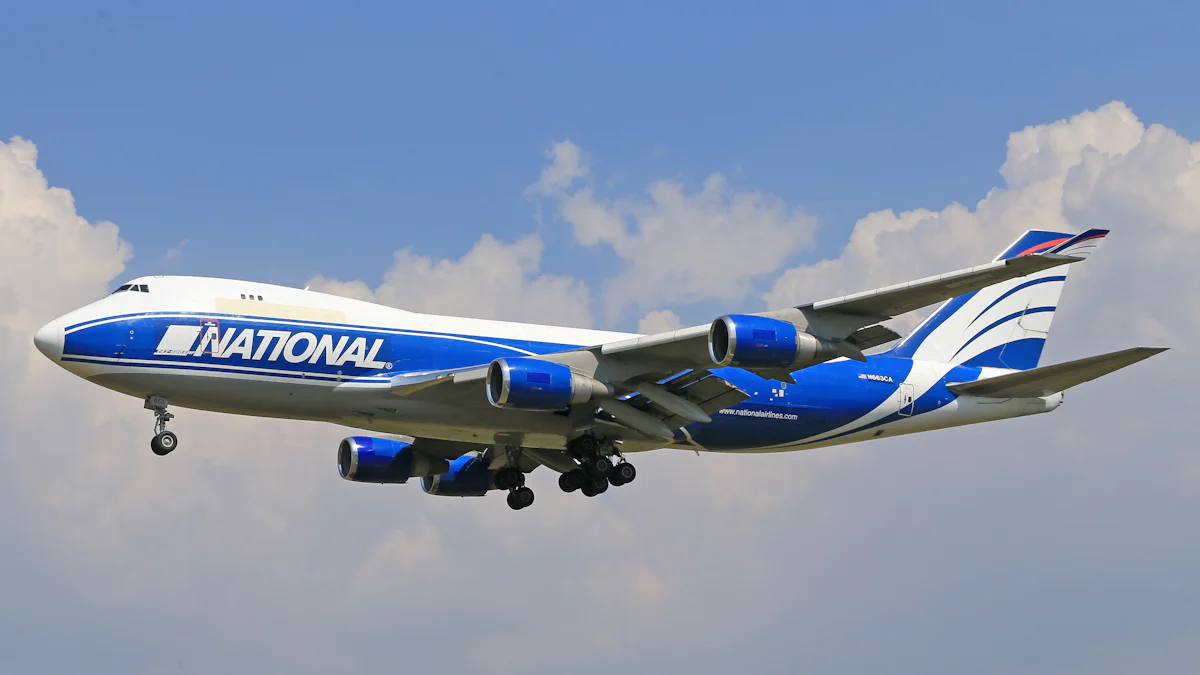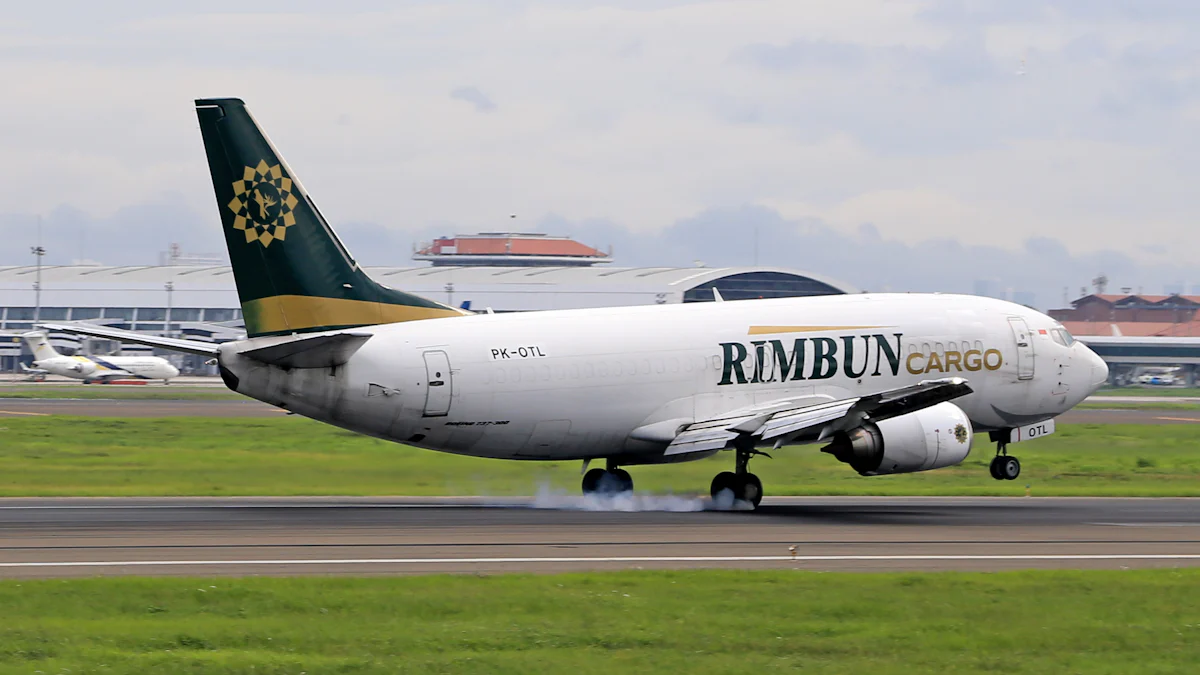2024: A Year of Adaptation and Sustainability for the Global Air Cargo Sector

The global air cargo sector stands at a critical juncture in 2024, a true year of adaptation. With double-digit growth in demand projected, the industry faces mounting pressure to align with sustainability goals. Customers, employees, and business partners increasingly demand environmentally responsible practices, with 80% of customers and 73% of employees prioritizing sustainability. The evolving landscape of air freight highlights the need for innovative solutions, such as Sustainable Aviation Fuel (SAF), to reduce carbon emissions. As the near-term future unfolds, collaboration and technological advancements will shape the industry's ability to thrive in this dynamic landscape.
Key Takeaways
The air cargo industry is projected to grow by 11.8% in 2024, driven by increased demand for rapid deliveries and the recovery from pandemic disruptions.
Sustainability is a top priority, with 80% of customers and 73% of employees emphasizing the need for environmentally responsible practices, including the adoption of Sustainable Aviation Fuel (SAF).
Technological advancements, such as AI and blockchain, are transforming logistics by enhancing efficiency, improving transparency, and reducing operational costs.
Collaboration across the supply chain is essential for achieving sustainability goals, with partnerships focused on optimizing routes and reducing carbon footprints.
Labor shortages pose a significant challenge, prompting the industry to invest in automation and workforce development to ensure operational efficiency.
Infrastructure upgrades, including the development of green airports, are crucial for minimizing environmental impacts and supporting the industry's long-term sustainability efforts.
Understanding shifts in global trade patterns and geopolitical influences will be vital for air cargo operators to maintain competitive advantages in 2024.
The Current State of the Global Air Cargo Industry
Key Developments in 2023 and Their Impact on 2024
Recovery from Pandemic-Driven Disruptions
The global air cargo industry has shown remarkable resilience in recovering from the disruptions caused by the COVID-19 pandemic. In 2023, air cargo traffic experienced steady growth as supply chains stabilized and demand for rapid deliveries surged. The transportation of critical goods, such as vaccines and medical supplies, highlighted the indispensable role of air freight in global logistics. This recovery has set the stage for further expansion in 2024, with projections indicating an 11.8% increase in air cargo traffic.
The rebound in world air cargo traffic has also been supported by the industry's ability to adapt to challenges. Airlines and freight forwarders have implemented advanced technologies to streamline operations and manage increasing volumes efficiently. These developments have not only improved service reliability but also positioned the air freight sector for sustained growth in the coming year.
Shifts in Global Trade Patterns and Supply Chains
Global trade patterns underwent significant shifts in 2023, driven by geopolitical tensions and evolving consumer demands. The Asia Pacific region emerged as a key player, with its major trade lanes fueling the growth of cross-border e-commerce. Countries like China, Vietnam, and India have become central to the air cargo rebound, as businesses diversify supply chains to mitigate risks.
The air cargo industry has also adapted to disruptions in maritime shipping by offering faster and more reliable alternatives. This shift has increased the reliance on air freight for high-value and time-sensitive goods. However, these changes have also introduced new challenges, such as imbalanced demand growth between regions like the U.S. and the EU. As the industry moves into 2024, understanding these shifts will be crucial for maintaining competitive advantages.
Challenges Facing the Industry
Rising Fuel Costs and Economic Volatility
The volatility of fuel costs continues to pose a significant challenge for the air cargo industry. In 2023, operational costs rose by 1% annually, driven by fluctuating oil prices and inflationary pressures. These rising costs have forced carriers to optimize their operations while maintaining competitive pricing. Current pricing trends indicate that cargo rates remain 20%-30% higher than pre-pandemic levels, adding financial strain to both operators and customers.
Economic instability, influenced by geopolitical events, further complicates the landscape. Trade policies and tariffs have the potential to disrupt supply chains, impacting the flow of goods and increasing operational risks. The air freight sector must navigate these uncertainties while striving to deliver consistent service quality.
Increasing Regulatory Pressure on Emissions
Environmental regulations have become a focal point for the air cargo industry as public scrutiny over carbon emissions intensifies. Aviation accounts for approximately 2.5% of global carbon emissions, prompting governments and organizations to implement stricter standards. In 2023, the push for sustainable practices gained momentum, with companies adopting solutions like Sustainable Aviation Fuel (SAF) to reduce their environmental impact.
The industry's commitment to achieving net-zero carbon emissions by 2050 underscores the urgency of addressing these challenges. However, compliance with environmental regulations requires significant investments in technology and infrastructure. Balancing sustainability goals with operational efficiency will remain a critical priority in 2024.
Labor Shortages and Workforce Challenges
Labor shortages have emerged as a pressing issue for the air cargo industry. The demand for skilled workers has outpaced supply, creating bottlenecks in critical areas such as ground handling and logistics. Workforce challenges have been exacerbated by the need for specialized training to operate advanced technologies and manage complex supply chains.
To address these issues, companies are investing in automation and workforce development programs. Collaborative efforts between industry stakeholders aim to attract talent and enhance employee retention. Overcoming labor shortages will be essential for sustaining the industry's growth trajectory in 2024.
Major Trends Shaping the Air Cargo Sector in 2024

The Growing Influence of E-Commerce
Demand for Faster and More Reliable Deliveries
The rapid expansion of e-commerce has transformed the air cargo industry. In 2024, businesses and consumers alike demand faster and more reliable deliveries. This shift has placed immense pressure on air freight operators to enhance efficiency and reduce transit times. The rise of last-mile delivery services has further emphasized the need for speed and precision in logistics. Companies are investing in advanced technologies, such as automated sorting systems and real-time tracking, to meet these expectations. These innovations not only improve delivery performance but also strengthen customer trust in air cargo services.
Expansion of Cross-Border E-Commerce Markets
Cross-border e-commerce continues to drive significant growth in the air cargo sector. The global B2B e-commerce market is projected to reach $36 trillion by 2026, underscoring the importance of international trade. In 2024, regions like Asia Pacific lead this expansion, with countries such as China, Vietnam, and India emerging as key players. Air freight operators are adapting by expanding their networks and optimizing routes to accommodate the surge in cross-border shipments. This trend highlights the critical role of air cargo in connecting businesses and consumers across borders, ensuring seamless trade in an increasingly interconnected world.
Sustainability Initiatives in the Industry
Adoption of Sustainable Aviation Fuel (SAF)
Sustainability remains a top priority for the air cargo industry in 2024. The adoption of sustainable aviation fuel (SAF) has gained momentum as operators strive to reduce their carbon footprint. SAF offers a viable solution for lowering emissions without compromising performance. Airlines are partnering with fuel providers to scale production and integrate SAF into their operations. This shift aligns with the industry's commitment to achieving net-zero carbon emissions by 2050. By embracing SAF, air cargo companies demonstrate their dedication to environmental responsibility while meeting regulatory requirements.
Fleet Modernization and Energy Efficiency
Fleet modernization plays a pivotal role in advancing sustainability goals. In 2024, air cargo operators are replacing older aircraft with fuel-efficient models to enhance energy efficiency. These modern fleets consume less fuel and produce fewer emissions, contributing to a greener future for the industry. Additionally, operators are implementing lightweight materials and aerodynamic designs to further optimize performance. These efforts not only support sustainability but also reduce operational costs, creating a win-win scenario for businesses and the environment.
External Influences on the Industry
Geopolitical Events and Trade Policies
Geopolitical events and trade policies significantly impact the air cargo sector. In 2024, shifting trade dynamics and regional tensions continue to shape the flow of goods. Operators must navigate complex regulations and tariffs while maintaining service reliability. The ongoing diversification of supply chains, driven by geopolitical uncertainties, has increased demand for air freight as a flexible and dependable alternative. By staying agile and proactive, the industry can mitigate risks and capitalize on emerging opportunities.
Climate Change and Its Impact on Operations
Climate change poses both challenges and opportunities for the air cargo industry. Extreme weather events disrupt operations, causing delays and increasing costs. At the same time, the industry's response to climate change drives innovation and resilience. Investments in sustainable infrastructure, such as green airports and energy-efficient facilities, help mitigate environmental impacts. These initiatives not only address immediate challenges but also position the industry as a leader in sustainability. By prioritizing climate adaptation, air cargo operators can ensure long-term growth and stability.
The Role of Digitalization and Technology
Implementation of AI and Machine Learning in Logistics
Artificial Intelligence (AI) and Machine Learning (ML) are revolutionizing logistics in the air cargo industry. These advanced technologies enable operators to optimize routes, predict demand patterns, and enhance operational efficiency. AI-powered systems analyze vast amounts of data to identify trends, allowing companies to make informed decisions and reduce delays. For instance, predictive analytics helps forecast peak shipping periods, ensuring resources are allocated effectively.
Machine Learning algorithms also improve warehouse management by automating inventory tracking and streamlining sorting processes. This reduces human error and accelerates cargo handling times. Additionally, AI-driven tools enhance customer experiences by providing real-time shipment tracking and accurate delivery estimates. As the air cargo sector faces increasing demand from e-commerce growth, these innovations play a critical role in maintaining reliability and meeting customer expectations.
"AI and ML are not just tools; they are transformative forces reshaping the logistics landscape," remarked an industry expert during the 2024 IATA World Cargo Symposium.
Blockchain for Enhanced Transparency and Security
Blockchain technology is emerging as a game-changer for transparency and security in air cargo operations. This decentralized ledger system ensures that every transaction and shipment detail is recorded immutably, reducing the risk of fraud and errors. By providing a single source of truth, blockchain fosters trust among stakeholders, including shippers, carriers, and customs authorities.
One of the most significant applications of blockchain in logistics is its ability to streamline documentation processes. Smart contracts automate tasks such as payment releases and compliance checks, eliminating delays caused by manual interventions. Furthermore, blockchain enhances cargo security by enabling end-to-end visibility of shipments. Operators can track goods in real time, ensuring accountability at every stage of the supply chain.
The integration of blockchain aligns with the industry's push for digitalization and sustainability. By reducing paperwork and improving efficiency, this technology minimizes resource consumption and supports environmentally responsible practices. As air cargo companies adapt to the challenges of 2024, blockchain stands out as a vital tool for building resilient and transparent operations.
Strategies for Adaptation and Sustainability

Embracing Innovation and Technology
Investment in Automation and Smart Warehousing
The air cargo industry is leveraging automation to enhance operational efficiency and reduce costs. Automated systems, such as robotic sorting and loading mechanisms, streamline processes and minimize human error. These technologies enable faster handling of shipments, ensuring timely deliveries. Smart warehousing solutions, equipped with IoT sensors and automated storage systems, optimize inventory management and improve space utilization.
For instance, digitalization has transformed logistics by providing real-time visibility and seamless information flow. Companies adopting these advancements have reported significant improvements in service delivery. By integrating automation into their operations, air cargo operators can meet growing demand while maintaining high standards of reliability.
Leveraging Data Analytics for Predictive Insights
Data analytics plays a pivotal role in helping the air cargo sector anticipate challenges and optimize performance. Predictive analytics tools analyze historical data to forecast demand patterns, enabling operators to allocate resources effectively. This proactive approach reduces delays and enhances customer satisfaction.
Artificial Intelligence (AI) and Machine Learning (ML) further strengthen these capabilities. AI-powered systems identify trends and provide actionable insights, allowing companies to make informed decisions. For example, predictive models can help forecast peak shipping periods, ensuring that cargo flows remain uninterrupted. By embracing data-driven strategies, the industry positions itself for sustainable growth.
Collaboration Across the Supply Chain
Partnerships with Sustainable Fuel Providers
Collaboration with sustainable fuel providers is essential for reducing the environmental impact of air cargo operations. Airlines are increasingly adopting Sustainable Aviation Fuel (SAF) to lower carbon emissions. SAF offers a cleaner alternative to traditional jet fuel, aligning with the industry's commitment to achieving net-zero emissions by 2050.
Partnerships with fuel suppliers ensure a steady supply of SAF, enabling operators to integrate it into their fleets. These collaborations also drive innovation in fuel production, making SAF more accessible and cost-effective. By prioritizing sustainability in fuel sourcing, the air cargo sector demonstrates its dedication to environmental responsibility.
Joint Efforts to Reduce Carbon Footprints
Reducing carbon footprints requires collective action across the supply chain. Stakeholders, including airlines, freight forwarders, and logistics providers, are working together to implement eco-friendly practices. Joint initiatives focus on optimizing routes, minimizing empty flights, and improving load factors to reduce fuel consumption.
Data sharing among supply chain partners enhances transparency and fosters collaboration. For example, real-time tracking systems allow stakeholders to monitor shipments and identify opportunities for efficiency. These efforts not only support sustainability goals but also strengthen relationships within the air cargo community.
Infrastructure Upgrades and Modernization
Development of Green Airports and Facilities
Green airports and facilities are transforming the air cargo landscape by prioritizing sustainability. These infrastructure upgrades include energy-efficient buildings, renewable energy sources, and waste reduction programs. Airports are also investing in electric ground support equipment to minimize emissions during cargo handling.
For example, some airports have implemented solar panels and wind turbines to power their operations. These initiatives reduce reliance on fossil fuels and contribute to a greener future. By adopting sustainable infrastructure, the air cargo industry sets a benchmark for environmental stewardship.
Enhancing Cold Chain Capabilities for Perishables
Cold chain logistics is critical for transporting temperature-sensitive goods, such as pharmaceuticals and fresh produce. Enhancing cold chain capabilities ensures that perishable items reach their destinations in optimal condition. Advanced refrigeration systems and temperature monitoring technologies maintain product integrity throughout the supply chain.
Air cargo operators are upgrading their facilities to accommodate the growing demand for cold chain services. These investments not only improve service quality but also expand market opportunities. By strengthening cold chain infrastructure, the industry supports global trade and meets the needs of diverse customers.
Policy Advocacy and Industry Leadership
Engaging with Governments on Emission Standards
The air cargo industry plays a pivotal role in addressing global environmental challenges. Engaging with governments has become a critical strategy for aligning industry practices with evolving emission standards. Regulatory bodies worldwide are tightening aviation emission requirements, pushing operators to adopt cleaner technologies and sustainable fuels. Air cargo companies actively collaborate with policymakers to shape practical and achievable regulations that balance environmental goals with operational feasibility.
For instance, the industry's commitment to achieving net-zero carbon emissions by 2050 has driven partnerships with government agencies to promote the adoption of Sustainable Aviation Fuel (SAF). These collaborations ensure that SAF production scales efficiently while remaining accessible to operators. Additionally, air cargo stakeholders advocate for incentives, such as tax breaks or subsidies, to offset the high costs of transitioning to greener technologies. By fostering open communication with governments, the industry demonstrates its dedication to reducing its environmental footprint while maintaining global trade efficiency.
Promoting Global Standards for Sustainable Practices
Standardization is essential for ensuring consistency and accountability in the air cargo sector's sustainability efforts. Promoting global standards allows operators to adopt uniform practices, reducing inefficiencies and enhancing collaboration across borders. Organizations like the International Air Transport Association (IATA) play a key role in establishing these benchmarks, which include guidelines for carbon reporting, SAF usage, and energy-efficient operations.
The air cargo industry also emphasizes the importance of digitalization in achieving sustainability goals. Technologies such as blockchain and real-time tracking systems enhance transparency, enabling stakeholders to monitor emissions and optimize routes. These innovations align with global standards, ensuring that operators meet regulatory requirements while improving operational efficiency.
Collaboration among industry leaders further strengthens the push for standardized practices. Initiatives like the IATA World Cargo Symposium bring together stakeholders to discuss strategies for harmonizing sustainability efforts. By uniting under shared goals, the air cargo sector positions itself as a leader in environmental responsibility, setting an example for other industries to follow.
The air cargo sector in 2024 exemplifies a "year of adaptation," where agility and sustainability define success. Operators embrace innovation, such as automation and robotics, to enhance efficiency and reduce errors in cargo handling. Collaborative efforts, like Heathrow Airport's push for sustainable aviation fuel (SAF), showcase the industry's commitment to environmental responsibility. Facilities like Hong Kong, achieving comprehensive CEIV certifications, highlight the importance of high-value goods handling. These advancements position the industry to navigate challenges and seize opportunities, ensuring resilience and growth in the future.
See Also
Exploring Innovations in Sea Freight Logistics for 2024
JUSDA's Logistics Expansion: A Focus on Sustainable Practices
Transforming Supply Chain Sustainability: JUSDA's Approach
